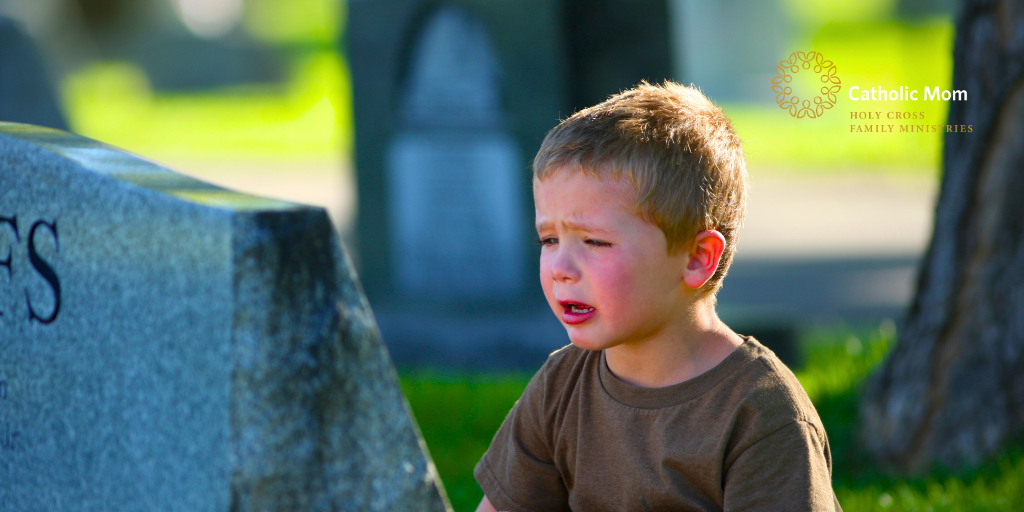
Katie Fitzgerald reflects on the benefits of taking young children to funerals.
A Roadmap for Handling Death
As much as circumstances have allowed, I have always taken my children to wakes and funerals, even at very young ages. I have found this to be a fruitful and helpful practice for our family. If you are trying to decide whether to bring children to a funeral, here are some points to consider that I hope will encourage you to take them.
Everyone on Earth experiences death as a mysterious unknown. We don’t know what it feels like, and there isn’t anyone who can tell us about the experience so we can prepare. Part of our human nature, even for children, is to fear the unknown. While we can’t provide all the answers to the questions our children might have about death, a funeral does give us the opportunity to show our children what Catholics do when someone dies. It gives them a roadmap for thinking about and handling death.
When my father passed away in 2018, I had three children under the age of five. They were present with the open casket at the funeral home, and they sat with us while we prayed a Rosary. At the church, they brought up the gifts as part of Mass, and they stood with our family at the graveside. By walking through these steps with their parents and other relatives, they began to build their understanding of death in concrete, child-friendly terms. They learned that our faith has certain rites and rituals that we perform when a loved one dies, and they will recognize them the next time they experience them.

Sadness is a Fact of Life
It’s also important to remember that it’s impossible to shield children from sadness. No one makes it through life — often not even through childhood — without knowing multiple people who have died. Keeping children away from funerals sends the message that something taboo or scary might be happening. It creates an additional layer of mystery and confusion around death that can contribute to a lingering fear as the child grows up.
I was sheltered from death as a kid, and as a result, I couldn’t read a book or watch a movie where anyone died. I lacked the coping skills to deal with even a fictional death because the adults in my life were so cagey about death and dying. My children, by contrast, are much less upset by death in stories and films. Their experience attending funerals has given them a context for thinking about what happens at the end of a human life. Catholics are also unique among Christians in our emphasis on memento mori, which is Latin for “remember that you will die.” It is impossible to raise children in the fullness of our faith without passing on this aspect of it along with the rest.
Kids Need Closure, Too
Finally, like many adults, kids also need the closure of saying goodbye to a deceased loved one. My second oldest daughter, who was two at the time, spent my dad’s entire wake sitting on the kneeler beside his casket. She was completely unfazed by him lying there, and it seemed to comfort her in some way to spend that time by his side. My oldest daughter, who was almost five, found solace in kneeling beside her aunt to pray for Grandpa’s soul. It was clear to me that being able to say goodbye helped them process what was happening in a way that simply hearing about the funeral after the fact could not have done.
Adults often worry that taking kids to funerals is creepy, morbid, or emotionally scarring. Most of the time, the opposite is true. By exposing children to our faith’s rituals surrounding death, we give them a framework for dealing with the inevitable losses we all face as human beings, and we teach them the important truth that death is a part of life.

Share your thoughts with the Catholic Mom community! You'll find the comment box below the author's bio and list of recommended articles.
Copyright 2025 Katie Fitzgerald
Images: Canva
About the Author

Katie Fitzgerald
Katie Fitzgerald is a former children's librarian turned homeschooling mom. She and her librarian husband live in Maryland with their five children: three big sisters and a set of boy/girl twins. She blogs about homeschooling and reading at ReadAtHomeMom.com and writes short fiction, some of which appears in online magazines and print anthologies. Connect with her on Instagram @katiefitzstories.


.png?width=1806&height=731&name=CatholicMom_hcfm_logo1_pos_871c_2728c%20(002).png)
Comments